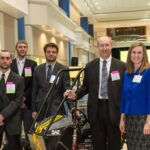
Each year, the Hrabowski Fund for Innovation provides funding to faculty initiatives that challenge students to be active in their education and encourage faculty to be innovative and work across disciplines. Four projects received awards in the spring 2016 round of the grant program.
Cedric Herring, professor and director of the Language, Literacy, and Culture Ph.D. program, and Loren Henderson, assistant professor of sociology and anthropology, received a grant for “The Baltimore Metropolitan Area Study on Race, Inequality and the City: A Graduate Student Survey Research and Training Program.” Herring and Henderson will create a new multidisciplinary graduate program that trains students in survey research methods while generating social science data on issues of race and inequality in the Baltimore region to be shared with community leaders and policymakers to inform future decision-making.
Neil Rothman, professor of the practice of mechanical engineering, and Andrew Gadsden, assistant professor of mechanical engineering, will strengthen the foundation of the undergraduate mechanical engineering program by offering opportunities for students to explore conventional fabrication processes—skills and knowledge that are in high-demand when entering the workforce. The project is called “Incorporating CNC Machining in a Machine Design Course.” The team will integrate computer numerical control (CNC) machine tools into the program’s machine design course to give students experience designing, building, and testing machines and fabricating components.
Two seed grants were also awarded through the 2016 Hrabowski Fund for Innovation competition. Ian Anson, assistant professor of political science, received a seed grant for “’Nobody’s Ever Asked That Question’: Implementation of Student-led Survey Projects to Enhance Analytical Skills in the Social Sciences.” He will develop a new course that allows students to collaborate on the design, implementation, and analysis of a large-scale national online survey. The goal of the course is to help students develop analytical research skills and engage them in understanding research methods by shifting learning experiences from instructor-driven to student-led.
Katherine Gibson and Jeremy Dixon, lecturers in computer science and electrical engineering, will use seed grant funding to look at ways in which the campus can reduce academic integrity violations in computer science programs. The “Improving Student Support to Reduce Academic Integrity Violations for Computer Science I and II” team will implement an improved system for educating students on class policies that uses aural and visual resources and a mandatory quiz to test comprehension. The new approach will also include developing and promoting supplemental academic opportunities for students struggling with course material.
Proposals for the next round of Hrabowski Innovation Fund grants are due on October 14, 2016. For more information and to apply, visit UMBC’s Faculty Development Center.
Image: Neil Rothman, third from right, with Dean Julie Ross and members of UMBC’s Baja team; photo by Marlayna Demond ’11 for UMBC.





